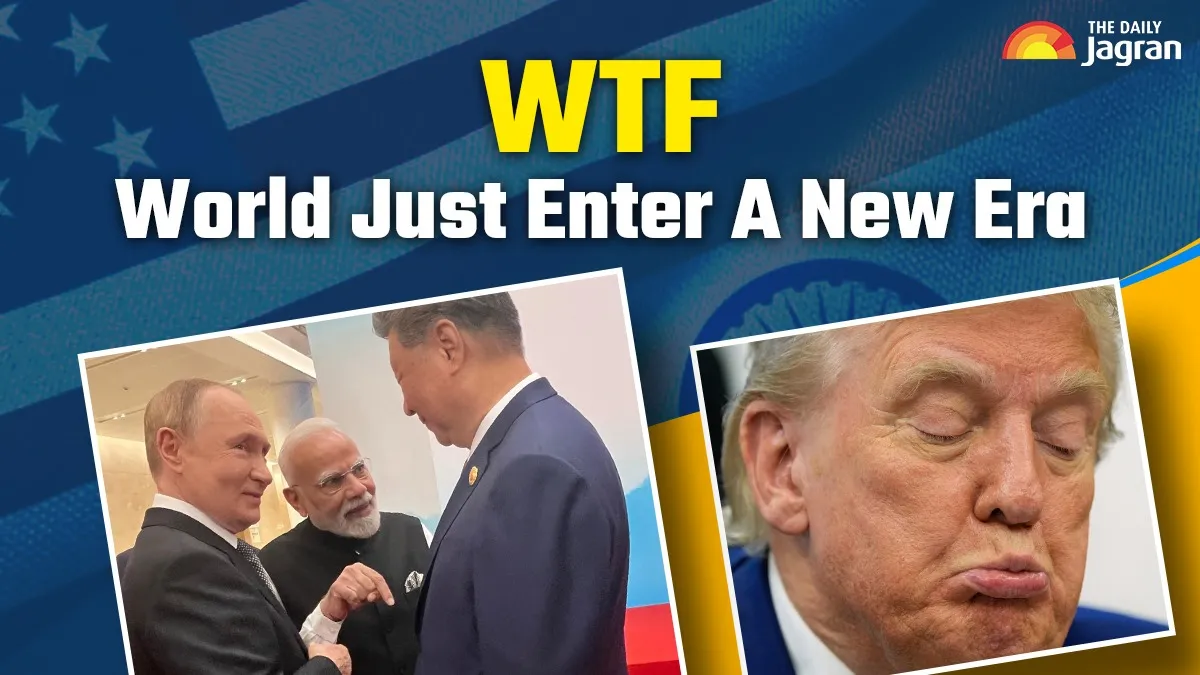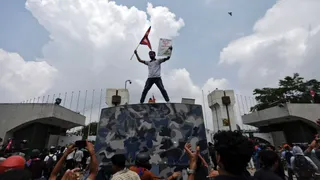- By Ajeet Kumar
- Thu, 04 Sep 2025 04:28 PM (IST)
- Source:JND
WTF Happened In China: The leaders of India, Russia, China, and seven other nations met in northern China for the latest annual summit of the Shanghai Cooperation Organisation (SCO) on Monday. The meeting, which went crazy viral in the Western and European media, could pose an emerging challenge to America’s global leadership.
The 10-member SCO, which gathered in the port city of Tianjin, has grown in size and influence since its founding 24 years ago, at a time when US President Donald Trump unleashed a tariff war against nearly all countries on the planet.
PM Modi's smiling entry changed Trump’s power equation
Since the Russia-Ukraine war began, India has become a major buyer of Russian oil, increasing tensions with Washington. Although Trump bombarded New Delhi with a 50 per cent tariff for Russian oil purchases, which he dubbed a crucial punitive measure against Moscow, it is obvious the goal wasn't the same as mentioned by the US President. In fact, China is the top buyer of Russian crude, and yet the Trump administration has granted relief by not imposing similar tariffs, at least until November. Ever since the American President imposed heavy tariffs on New Delhi, relations have nosedived to a great extent.
Recommended For You

(CREDIT: REUTERS)
At the SCO Summit, the smiling photograph of PM Modi, Russian President Vladimir Putin, and his Chinese counterpart Xi Jinping marked a major blow to the Trump administration. This was seen as "steady progress" in improving IndiaChina relations after a meeting with its top diplomat in August, and noted "respect for each other’s interests and sensitivities."
This video of the priest king is going hard 🔥💀 pic.twitter.com/VSBaCeZOhS
— Truth Vibe ⭐ (@GlobeStoryHQ) September 1, 2025
A clear message to Trump: World power has just shifted
Besides, it sent a clear signal to the West that America's monopoly has diminished, especially as PM Modi signalled an intent to improve ties and trade with Beijing, a move Trump lamented as the US wants New Delhi on its side to balance Beijing's power in the Global South.
Moreover, PM Modi and Putin showcased a strong bond and hinted at more collaboration in trade. However, no comments were made regarding the crude oil trade.
-1756982841398.jpg)
(CREDIT: REUTERS)
ALSO READ: What Is SCO Summit 2025? List Of Countries That Participated, Their Agenda And Key Highlights
The SCO Summit has proved that, in a matter of weeks, Trump and his administration have unravelled decades of careful diplomacy between Washington and New Delhi. His actions have deeply bruised the pride of a nation, India, which, after years of keeping the US at arm’s length, was finally warming to the idea of being a key regional ally. The next time Washington offers a hand of friendship, a more guarded India may pause, carefully measuring the length of the dagger hidden in the other hand.
Group showcases Xi Jinping’s multipolarity vision
China, which the US has long projected as losing its presence in the Global South, has bounced back with more power. Since the COVID-19 pandemic, America has attempted to counter China's dominance in world politics. The Trump administration, on multiple occasions, claimed to have isolated Beijing on the world power map. However, the attendance of global leaders in Beijing has shown that Xi still maintains stature on the global stage. University of Chicago political scientist Dali Yang said the SCO is one of the most prominent regional organisations China has co-founded.
-1756982875101.jpg)
"For China’s leadership, there is a lot of emphasis on maintaining existing relations in the international arena, even though the SCO has not been effective in dealing with the major challenges of today," news agency the Associated Press quoted Yang as saying.
The SCO seems to want to move from being a dialogue platform to a "full-fledged mechanism of practical cooperation that brings tangible results to the citizens of the member states," said June Teufel Dreyer, a University of Miami expert on Chinese politics. Yet the questions remain: "To what end, and how?"
For China’s President Xi Jinping, "presiding over the gathering in Tianjin should net him some favorable publicity and possibly further his image as leader of a new global world order," Dreyer said.
(With inputs from agency)






